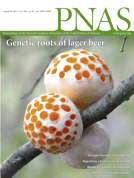城市噪音是一种不可忽视的污染源。汽车喇叭声和机器轰鸣声,让鸟儿“夫妻”在交谈时提高了嗓门。可如果雄鸟长期将本该在“耳鬓厮磨”时的低声呢喃换成高声叫喊,雌鸟不仅会拒绝生育,甚至还可能“红杏出墙”。

荷兰莱顿大学研究人员在最新一期美国《国家科学院学报》上发表报告说,他们以荷兰的大山雀为对象,对其在求偶期和交配期的叫声进行了研究。结果显示,城市产生的噪音迫使大山雀改换声调,以更高的频率“歌唱”。
研究发现,高频歌声不但会降低雄鸟对异性的吸引力,也不利于雄鸟维持配偶对自己的忠诚度。研究人员说,这项研究将有助于分析噪音污染对鸟类繁殖密度的影响,以及人类活动对环境和动物习性的影响等。
研究显示,生活在嘈杂都市的大山雀比生活在较安静地区的同类叫声更尖厉。雄鸟为吸引更多异性注意,以便繁殖后代,更要拔高“嗓门”,让雌鸟更清楚地听到自己的呼唤。但大嗓门对雄鸟来说不但不能彰显“个人魅力”,还会使自己的“形象”大打折扣。研究人员在不同环境噪音中向雌鸟播放了录制的不同频率的雄鸟叫声,结果显示,雄性大山雀的高频歌声不仅对异性的诱惑力较低,还可能会让雌鸟“另寻新欢”。
研究发现,如果没有噪音污染,在雌性大山雀生殖能力处于峰值时期,雄鸟更喜欢用低沉的声音唱歌,因为“温柔”的歌声更有助于诱惑和鼓励雌鸟进行交配。

Low-frequency songs lose their potency in noisy urban conditions
Wouter Halfwerk, Sander Bot, Jasper Buikxa, Marco van der Velde, Jan Komdeur, Carel ten Cate, and Hans Slabbekoorn
Many animal species communicate with their mates through acoustic signals, but this communication seems to become a struggle in urbanized areas because of increasing anthropogenic noise levels. Several bird species have been reported to increase song frequency by which they reduce the masking impact of spectrally overlapping noise. However, it remains unclear whether such behavioral flexibility provides a sufficient solution to noisy urban conditions or whether there are hidden costs. Species may rely on low frequencies to attract and impress females, and the use of high frequencies may, therefore, come at the cost of reduced attractiveness. We studied the potential tradeoff between signal strength and signal detection in a successful urban bird species, the great tit (Parus major). We show that the use of low-frequency songs by males is related to female fertility as well as sexual fidelity. We experimentally show that urban noise conditions impair male–female communication and that signal efficiency depends on song frequency in the presence of noise. Our data reveal a response advantage for high-frequency songs during sexual signaling in noisy conditions, whereas low-frequency songs are likely to be preferred. These data are critical for our understanding of the impact of anthropogenic noise on wild-ranging birds, because they provide evidence for low-frequency songs being linked to reproductive success and to be affected by noise-dependent signal efficiency.
文献链接:https://www.pnas.org/content/early/2011/08/18/1109091108.abstract








